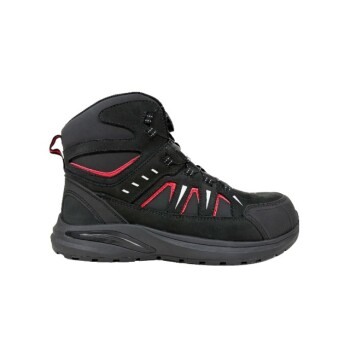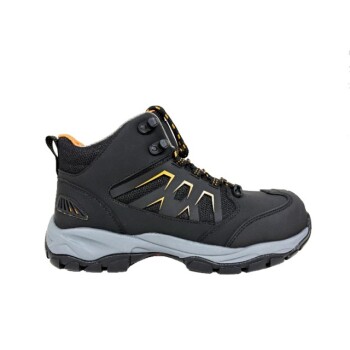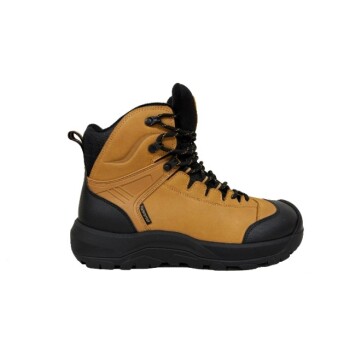To effectively manage the pain from plantar fasciitis, you should focus on a combination of immediate relief and corrective exercises. The most recommended methods include applying ice to reduce inflammation, performing specific daily stretches to lengthen the fascia, and using over-the-counter support like appropriate painkillers or insoles.
The core principle for treating plantar fasciitis is not just to mask pain, but to actively reduce the inflammation and mechanical stress on the plantar fascia ligament. Success comes from combining immediate symptom control with consistent, long-term corrective habits.
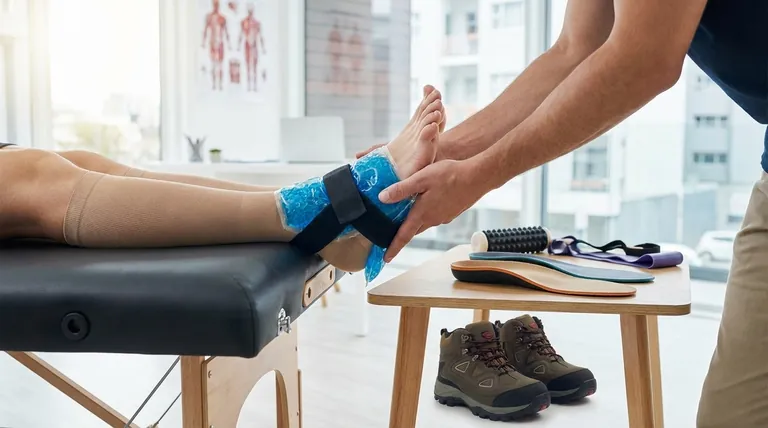
A Two-Pronged Approach: Immediate Relief and Long-Term Healing
Effective management requires addressing both the acute pain and the underlying cause of the tissue strain. These strategies work in concert to break the cycle of inflammation and re-injury.
H3: Reducing Acute Inflammation with Cold Therapy
Applying an ice pack is a primary method for immediate relief. The cold constricts blood vessels, which helps reduce swelling and numb the sharp pain associated with inflammation.
Apply ice for up to 20 minutes at a time, every 2-3 hours. It is critical to avoid heat packs, as heat can increase blood flow and worsen inflammation in this type of acute injury.
H3: The Critical Role of Morning Stretches
The classic sharp, stabbing pain with the first steps of the day occurs because the plantar fascia tightens overnight. Stretching before you get out of bed is crucial for gently preparing the ligament for weight-bearing.
Dedicate two minutes each morning to this routine:
- Lie on your back and gently pull your toes up towards your knee to stretch the arch.
- Slowly point your toes away from you.
- Gently rotate your feet in circles from the ankle.
H3: Leveraging Over-the-Counter Support
A pharmacist can provide valuable guidance on two key tools for managing plantar fasciitis.
Painkillers, particularly non-steroidal anti-inflammatory drugs (NSAIDs), can help manage pain and reduce inflammation. Supportive insoles or heel pads provide cushioning and arch support, reducing the daily strain on your plantar fascia.
Common Pitfalls and When to Escalate
Simply treating the pain without addressing the cause is a common mistake that prolongs recovery. Understanding these pitfalls is key to making real progress.
H3: Relying Solely on Painkillers
Pain medication can make you comfortable, but it does not fix the underlying mechanical problem. Using it without also doing stretches and addressing footwear can mask a worsening condition.
H3: Ignoring Your Daily Footwear
Unsupported footwear, such as flat shoes or worn-out sneakers, is a primary contributor to plantar fasciitis. Using insoles is a good step, but they work best inside a stable, supportive shoe.
H3: Pushing Through the Pain
Plantar fasciitis is a repetitive strain injury. Continuing high-impact activities or ignoring the pain signals from your body will only lead to more inflammation and a much longer recovery time.
H3: Delaying Professional Advice
If self-care measures do not bring significant improvement within a couple of weeks, it is essential to seek professional help. A GP or physiotherapist can confirm the diagnosis, rule out other issues, and provide a more advanced treatment plan.
Making the Right Choice for Your Situation
Your immediate actions should align with your primary goal, whether it's managing a flare-up or building a long-term prevention strategy.
- If your primary focus is immediate relief from severe pain: Prioritize consistent icing every 2-3 hours and consult a pharmacist about appropriate anti-inflammatory medication.
- If your primary focus is preventing intense morning pain: Make the simple, two-minute stretching routine a non-negotiable habit before your feet touch the floor each day.
- If your primary focus is long-term recovery and prevention: Combine daily stretching with a critical evaluation of your footwear, incorporating supportive insoles to reduce daily strain.
- If your pain is not improving or is getting worse: Schedule an appointment with your GP or a physiotherapist for a professional diagnosis and a structured treatment plan.
By combining immediate symptom management with consistent, corrective habits, you can take control of your recovery and work towards lasting relief.
Summary Table:
| Method | Purpose | Key Action |
|---|---|---|
| Ice Therapy | Reduce acute inflammation | Apply ice for 20 mins every 2-3 hours |
| Morning Stretches | Prevent morning pain | Perform gentle foot stretches before getting out of bed |
| OTC Support | Manage pain & provide support | Use NSAIDs and supportive insoles/heel pads |
| Proper Footwear | Address root cause | Wear stable, supportive shoes with good arch support |
Finding the right footwear is a critical step in managing plantar fasciitis. As a large-scale manufacturer, 3515 produces a comprehensive range of supportive footwear and boots for distributors, brand owners, and bulk clients. Our production capabilities encompass all types of shoes designed with the comfort and structural support needed for recovery. Let us help you provide the right solutions for your customers.
Contact 3515 today to discuss your footwear needs!
Visual Guide
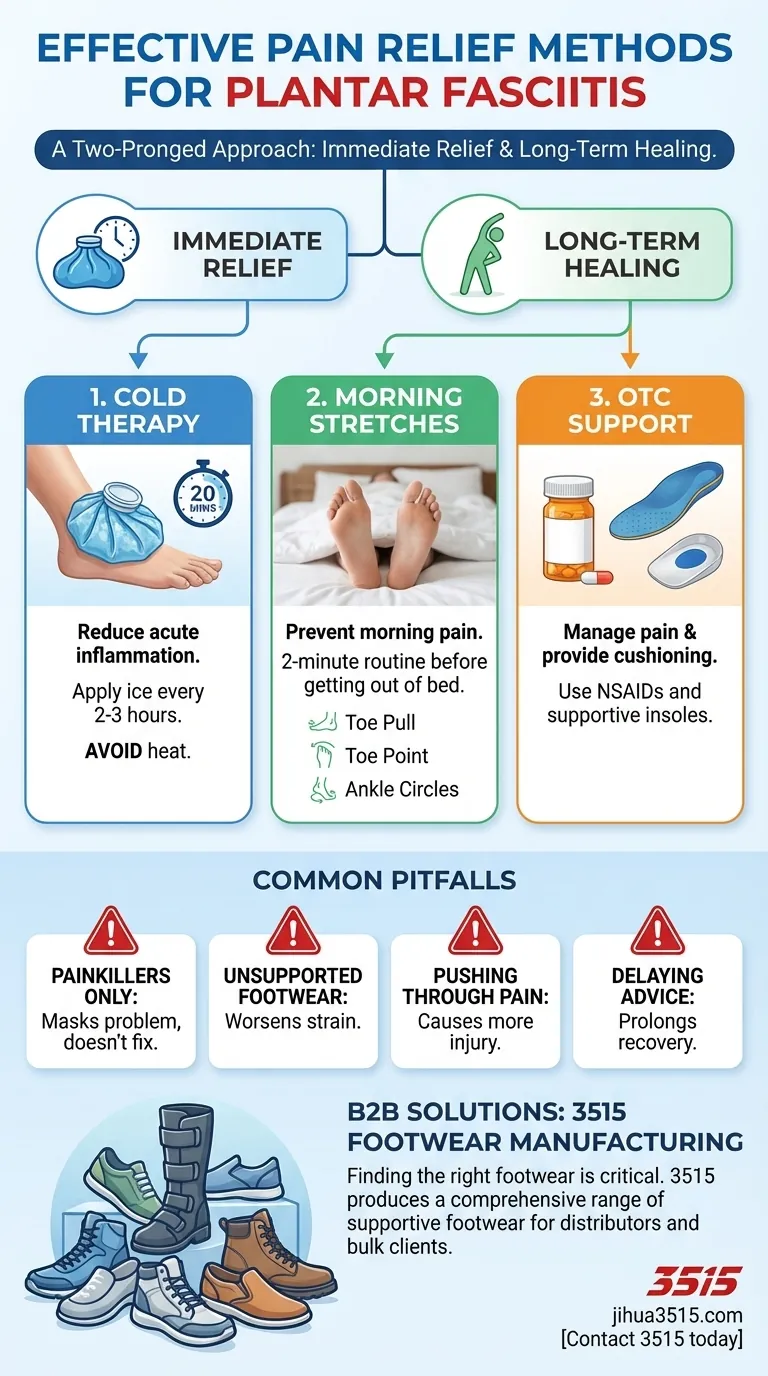
Related Products
- Safety Footwear Wholesale Manufacturer for Custom OEM/ODM Production
- Wholesale Durable Safety Boots | Custom Steel Toe & Puncture-Resistant Manufacturing
- Wholesale Customizable Safety Boots Durable & Protective Footwear Manufacturing
- Wholesale Safety Footwear Manufacturer for Bulk & Custom OEM Orders
- Customizable Anti-Smash Safety Boots for Wholesale & Private Label Manufacturing
People Also Ask
- How long can you wear safety boots? The Lifespan is Determined by Wear, Not Time
- What are OSHA approved shoes? Understanding the Correct Standards for Workplace Safety
- Do snake bite boots work? Your Ultimate Guide to Effective Snake Bite Protection
- How do safety shoes contribute to cost savings for companies? A Strategic Investment in Risk and Cost Management
- Is it normal to wear shoes in the house? A Guide to Hygiene, Comfort & Culture






